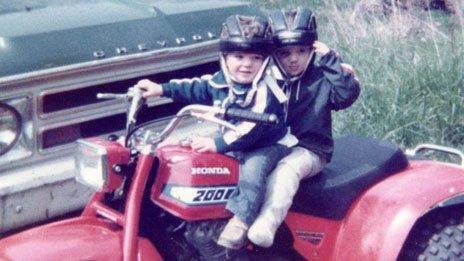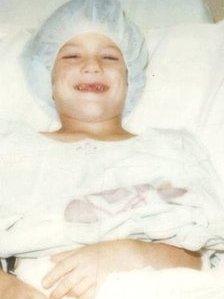Congenital analgesia: The agony of feeling no pain
- Published

Steven (right) with his brother Chris in 1983
Steven Pete and his brother were born with the rare genetic disorder congenital analgesia. They grew up - in Washington state, US - with a sense of touch but, as he explains in his own words, without ever feeling pain.
It first became apparent to my parents that something was wrong when I was four or five months old.
I began chewing on my tongue while teething. They took me to a paediatrician where I underwent a series of tests.
At first they put a cigarette lighter underneath my foot and waited for my skin to blister. Once they saw that I had no response to that then they began running needles up and down my spine. And since I had no response to either of those tests they came to the conclusion that I had what I have - congenital analgesia.
By which point, I had chewed off about a quarter of my tongue through teething.
We grew up on a farm. My mum and dad tried to be protective without stifling my brother and me. But when you're out in the country, especially if you're a boy, you're going to go out and explore and get in a little mischief.
So during my early childhood I was absent from school a lot due to injury and illness.
There was one time, at the roller-skating rink. I can't recall all of the details, but I know that I broke my leg. People were pointing at me because my pants were just covered in blood from where the bone came out. After that, I wasn't allowed to roller skate until I was much older.
When I was five or six years old, I was taken away from my home by child protective services. Someone had reported my parents for child abuse.

Steven Pete in hospital, aged five
I was in the state's care for, I believe, two months. And during that time I broke my leg before they finally realised that my parents and the paediatrician were telling the truth about my condition.
At school, a lot of children would have questions about my condition. They would ask: "Why do you have a cast on?" Most of the time I was in a cast, until I was around 11 or 12.
I was involved in fights quite frequently. Whenever a new kid came to school, the children would try to get that person to come and pick a fight with me, as a kind of introduction to the school. They would say: "If you can't feel pain, you will once I'm done with you."
Nowadays, I am not a particularly reckless person. I believe I'm actually more vigilant than most people because I know that if I were to injure myself I wouldn't know how severe it would be.
Internal injuries are the ones I fear the most. Appendicitis is what really scares me. Usually whenever I have any type of stomach issues or a fever I go to the hospital just to get it checked out.
The last time I had a broken bone, my wife actually noticed before I did. My foot was swollen, black and blue, so I went to the doctor and had an X-ray and they told me that I had broken two of my toes and they wanted to put a cast on it.
I had to go to work the next day. If had a cast on I wasn't going to be able to work for quite some time so I just told them I'd take care of myself. I went home and took some duct tape, taped it up, put my boots on and went to work that next morning.
One of the things I'm going to have to face soon is the fact that I won't have my left leg anymore. I've had quite a bit of surgery on my left knee in the past and it's got to the point where my doctors have told me to wait until it gives out completely. Once that occurs they're just going to have to amputate.
I really try not to think about it. I try not to let it get to me.
But I can't help thinking congenital analgesia was partly why my brother chose to take his own life.
His back was getting progressively worse. He was pretty close to graduating from a local college and the doctors told him that probably in the next year, year-and-a-half, he would be in a wheelchair.
He was an "outdoors man" - he liked to be outside, to fish and to hunt. But he tried to see about getting some sort of financial disability assistance once this would all happen. And pretty much what the judge told him was: "If you're not in pain then you have no reason to be on any type of assistance."
The thing is, with our condition, a lot of people see us and they might assume that we're healthy.
But they have no idea that my body could give out at any time, that I ache all over. I have severe arthritis in my joints. It's not painful - I don't feel pain - but it's hard to move around sometimes.
It feels like a compression, a throbbing compressed feeling in my joints. On a bad day it makes me very cranky when I have that feeling all day, because it's just a nuisance. It limits your mobility and your joint isn't able to move as much as it should.
As for doctors, I think they understand the condition. They just don't understand the human component of it - the psychology of what can happen when you grow up not being able to experience pain.
<italic>Steven Pete spoke to </italic> <link> <caption>Outlook </caption> <url href="http://www.bbc.co.uk/programmes/p002vsxt" platform="highweb"/> </link> <italic>for the </italic> <link> <caption>BBC World Service</caption> <url href="http://www.bbc.co.uk/worldservice/" platform="highweb"/> </link> <italic>.</italic>
<bold>Here is a selection of your comments.</bold>
Twenty-five years ago when working at a children's hospital, I was the social worker for two little Pakistani boys who suffered from it. The parents were first cousins and there had been much close relationship marriage in their histories. The paediatricians thought this was probably a contributing factor. As in this article, the injuries to the boys' tongues and limbs were horrendous. Both boys were fearless and the very young parents quite unable to control them, as the boys leapt from the top of wardrobes, held their hands over flames and chewed through their tongues. These children were only four and six when I knew them and I always wondered how long they would survive as I left the hospital to work elsewhere and never knew what happened to them. <bold>Susan King, Farnham, UK</bold>
My four-year-old son suffers from this condition. It's ironic you have done this article today as it's his birthday. He was diagnosed at nine months after fracturing his skull. We and my partner were also investigated for child abuse and he was put under social services care whilst on the hospital ward for three weeks. The investigation was just after the Baby P case, so tension was high and we felt very let down by the hospital staff, police and social services as we were guilty in all their eyes and they certainly let us know. They suddenly changed their views after it was confirmed he had this condition. Life with him is a daily struggle. <bold>Richard, UK</bold>
I do not suffer from this particular condition but do have fibromyalgia, Raynaud's and erythromelalgia. All these conditions are the polar opposite of the condition mentioned above yet I can relate to the comments regarding medical professionals. I am in constant pain, cannot control my body temperature and have to use a wheelchair to get around. I am fortunate to have found a sympathetic doctor who has experience treating this condition but there are many health professionals who treat it like a joke. They think you are making things up and are reluctant to give you the medication you need to just get through the day. Medical professionals need to realise that there are conditions out there that are essentially invisible but can still be extremely distressing and painful. <bold>Boris, Somerset, UK</bold>
I have always had a hign pain threshold and did not experience childbirth as painful at all. In recent years, though, I have a mysterious condition that means I did not react when a freshly made hot water bottle split over my feet and when doctors stick needles all over my legs. I am aware that they are doing it but feel no pain. I am learning to be careful and they have no idea what it might be. I am getting in touch to make sure you are aware of the spectrum of the 'analgesia' phenomenon. <bold>Caroline Davies, Welshpool, Wales</bold>